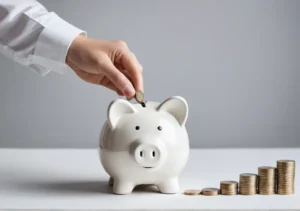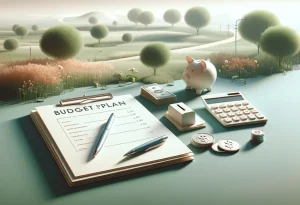
In today’s financial landscape, many find themselves weighing the tough choices between paying off debt and saving for the future. With life’s unexpected twists, the decision often feels like a high-stakes gamble between immediate relief and future security.
The best choice hinges on your unique financial situation and goals. If high-interest debt is looming, focusing on paying it down can yield quick relief and save you money over time. On the flip side, having savings can provide peace of mind and a buffer against unforeseen expenses. But unraveling the layers of this choice reveals more complexities—secrets that can significantly influence your path forward.
Key Takeaways:
- Prioritize paying off high-interest debt first to save money and reduce financial stress.
- Build an emergency fund with three to six months’ worth of expenses to protect against unforeseen costs.
- Use a systematic approach like the 50/30/20 rule to balance between saving and debt repayment effectively.
Disclaimer: The information on this blog is for general educational purposes only and does not constitute personalized financial advice. While we strive for accuracy, FinanceBeacon cannot guarantee the reliability or suitability of the content for your specific financial decisions. Always consult a qualified financial advisor before making any financial choices. Use this information at your own risk.
Why is Debt a Burden?
Debt can sneak up on you, changing the rhythm of your everyday life. The stress of knowing you owe money can be overwhelming. Each monthly payment isn’t just a dent in your budget; it’s a weight on your shoulders. This stress can trickle down into every aspect of your life, impacting your mental health, relationships, and even your job performance.
When you have debt, it often feels like you’re always playing catch-up. It eats away at your financial freedom, limiting your choices. You might hesitate to make a purchase, like a much-needed vacation or a new car, because those payments loom large. Even emergencies become a source of worry—unexpected car repairs or medical expenses could mean reaching for a credit card instead of turning to your savings. This cycle can lead to a feeling of being trapped.
And let’s not forget about the emotional toll. Anxiety about debt is a real issue for many people. Research shows that financial stress can lead to lower overall well-being. A study from the American Psychological Association highlights that financial worries often rank among the top stressors, right up there with health problems and job uncertainty.
In short, debt is more than just a financial issue; it seeps into your life and can dictate your choices and lifestyle.
How Does Saving Offer Security?
Having savings feels like having a safety net—an essential buffer in life’s unpredictable world. It’s not just about stashing money away; it’s about gaining peace of mind. Imagine being faced with an emergency—your car breaks down, or an unexpected medical bill arises. With savings, you can handle these surprises without breaking a sweat. No need to whip out a credit card, or worse, take out a personal loan just to manage life’s little hiccups.
Savings also empower you to reach future financial goals. Whether it’s buying a home, starting your own business, or planning for retirement, having a stash set aside makes those dreams more achievable. Think of that feeling when you know you’ve got funds dedicated to your aspirations—a feeling of liberation.
Additionally, building savings can help you weather storms in the economy, too. The job market can be unpredictable; having financial security means you can comfortably navigate job changes or sudden layoffs.
Setting aside savings doesn’t have to be daunting . Start small—consider the 50/30/20 rule as a guide: 50% for needs, 30% for wants, and 20% for savings debt repayment.
The choice between paying down debt or saving isn’t just a numbers game; it’s about measuring the impact on your current and future life. For some, prioritizing savings might lead to greater overall well-being—offering that peace of mind everyone deserves.
What is Your Interest Rate?
Interest rates can make a huge difference in your financial landscape. If you’ve got high-interest debt, like credit cards, paying that off might be your smartest move. For example, if you’re chipping away at a credit card with an interest rate of 20%, that’s money you’re losing every month compared to putting cash into savings—which typically yields much less, especially now with interest rates on savings accounts often hovering around 1% or 2%.
But, don’t ignore low-interest debt like some student loans or mortgages. If your mortgage is at 3%, it might be worth prioritizing savings instead of racing to pay that down, especially if you can earn more through investments. Aim to tackle the most costly interest rates first, but keep a balanced approach to savings as well.
Consider using the debt snowball or avalanche methods to strategize your payoff. The snowball approach focuses on paying off smaller debts first for motivation, while the avalanche method targets high-interest debts first for efficient savings long-term.
What are the Immediate Needs?
Your immediate needs often should guide whether you’re saving or paying down debt. Start by listing out your financial obligations—what bills are coming due, and which ones could cause stress if not paid on time? Rent, essential groceries, or a medical bill can take precedence over extra savings.
In addition to bills, think about your short-term goals. Do you need a new car or want to save for a vacation? Those expenses can sneak up. If they’re pressing, it makes sense to allocate some resources there rather than diving into savings.
Consider these criteria to prioritize:
- Payment deadlines: Are there any urgent bills or debts?
- Upcoming expenses: Are there any purchases you need soon?
- Emergency fund: Do you have at least three to six months of expenses saved? If not, that’s a fundamental priority.
Balancing between paying off high-interest debt and meeting immediate needs is a semi-delicate dance, but with a clear grasp of both your financial picture and goals, you can make choices that align with your well-being and financial future.
How to Assess Your Current Financial Health?
Taking a hard look at your finances isn’t just smart; it’s essential. To assess your financial health, consider these key components:
-
Debts : List all your debts along with the interest rates. Prioritize those with higher rates, like credit cards, as they eat away at your finances the fastest.
-
Income : Calculate your total monthly income, including salary and any side hustles.
-
Expenses : Track your monthly expenses to identify where your money goes. Break them into fixed (rent, utilities) and variable (dining out, entertainment) categories. Aim to find areas you can cut back.
-
Savings : Evaluate your current savings. Having an emergency fund that covers 3-6 months of expenses is essential before focusing on anything else.
-
Net Worth : Subtract your total debts from your total assets (savings, investments, property) to get a picture of your financial standing. A positive net worth is a good sign; a negative one indicates you might need to take action.
Once you’ve got this laid out, you can better decide whether to focus on paying off debt or building up savings. Striking a balance is key, but clarity on your starting point is essential first.
What Are the Psychological Benefits?
Focusing on either paying off debt or building savings can offer profound emotional and psychological benefits. Let’s break this down:
Freedom from Stress : Carrying debt often feels like a heavy weight on your shoulders. That never-ending anxiety about meeting payment deadlines can be draining. Paying down that debt can lead to a significant reduction in stress and financial anxiety.
Sense of Accomplishment : Each payment you make brings you closer to being debt-free. This journey can give you a sense of achievement that boosts your confidence and encourages positive financial habits.
Peace of Mind : Establishing a savings buffer provides a feeling of security. Knowing you’re prepared for unexpected expenses—like medical bills or car repairs—can make a world of difference in your mental well-being.
Future Security : Accumulating savings means you’re preparing for whatever life throws your way. Whether it’s starting a new venture, buying a home, or retirement, having a financial cushion opens up opportunities and enhances your overall quality of life.
Try combining these approaches. If you set aside a small percentage of your paycheck for savings while aggressively paying down debt, you can enjoy peace of mind knowing you’re on track to financial stability and freedom. Ultimately, the right choice depends on your individual circumstances, but the emotional rewards can be transformational.
What Do Experts Recommend?
Balancing debt repayment and savings can feel like walking a tightrope, but financial experts often emphasize the need for a strategic approach. Many advisors suggest the 50/30/20 rule as a starting point: allocate 50% of your income for essentials, 30% for discretionary spending, and 20% towards savings and debt repayment combined.
However, if you’re facing high-interest debt, like credit cards, savvy advisors recommend prioritizing that debt first. Paying it down quickly not only reduces your overall interest payments but also lessens your financial stress. Once high-interest debts are cleared, pour more into your savings.
Another angle that’s gaining traction is the importance of building an emergency fund. Aim for three to six months’ worth of expenses in a high-yield savings account before aggressively tackling other debts. This ensures you’re not pulling from your debt repayment efforts in the case of unexpected expenses.
In short, start by tackling high-interest debts while building a small emergency buffer, then reinforce your savings as you clear those debts. This balanced strategy can pave the way for a more secure financial future.
What Recent Studies Show?
Research suggests that the choice between paying off debt and saving has profound implications on one’s overall financial health. A notable study from the Urban Institute indicates that individuals focusing solely on debt repayment without any savings are more likely to face financial setbacks. Those with at least some savings reported greater financial security and less stress during economic downturns.
Additionally, a 2023 survey by Bankrate found that nearly 63% of Americans struggle to cover a $1,000 emergency, highlighting the perils of being debt-free but cash-poor. This illustrates that savings, even while in debt, create a buffer against emergencies that could lead to even more debt.
In practical terms, consider a hybrid approach: allocate some of your monthly budget to both savings and debt repayment. This way, you not only reduce debt effectively but also build that essential safety net. Being proactive about managing both areas can lead to improved financial stability over time.
As a financial advisor, my goal is to guide you through the world of personal finance with clear, practical advice. With a dedication to clarity and your financial well-being, I’m here to provide insightful guidance and support as you build a foundation of wealth and security.







